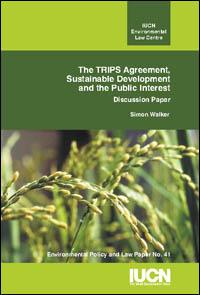Complete Title
The TRIPS agreement, sustainable development and the public interest : discussion paper
Description
This paper addresses the environmental and developmental impacts of patent protection by specifically focusing on the global agreement on Trade-Related Aspects of Intellectual Property Rights (TRIPS). While the TRIPS agreement serves as an important step in harmonizing international intellectual property systems, the author contends that it currently fails to properly balance public and private interests, especially in the gap between rich and poor. This thoughtful paper can serve as a base from which to debate a serious issue and suggest proposals for reform.
ISBN
978-2-8317-0604-7
2-8317-0604-1
Organization(s)
Imprint
Gland : IUCN, 2001
Physical Description
xiv, 60p.
Notes
Includes bibliographic references
Monographic Series
Keywords
Call number
More information 

Publisher
Bibliographic level
Monograph/item
Physical medium
Printed
PDF
Number of library copies
2
Print availability status
Status unknown

